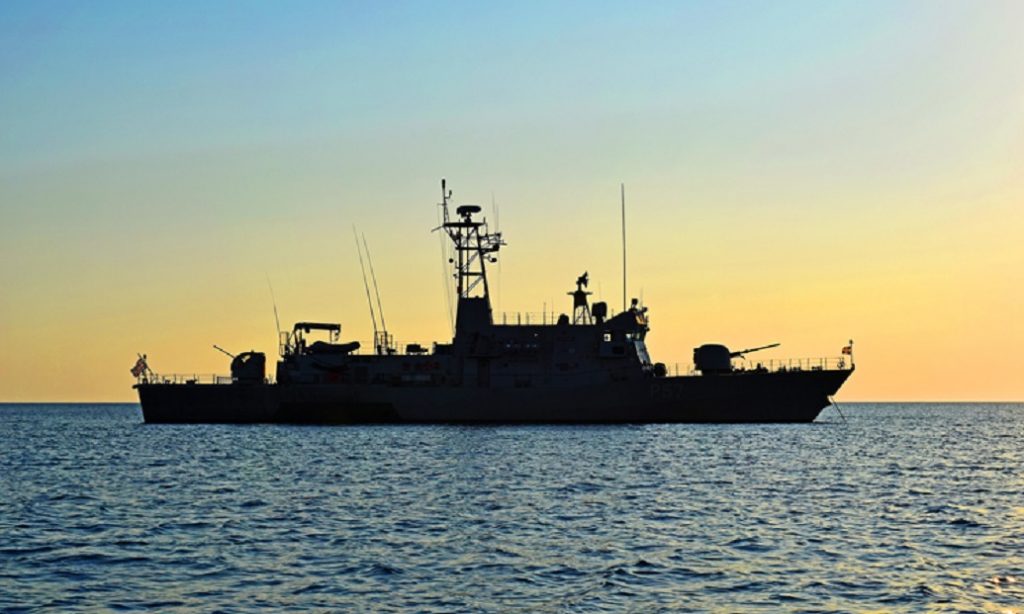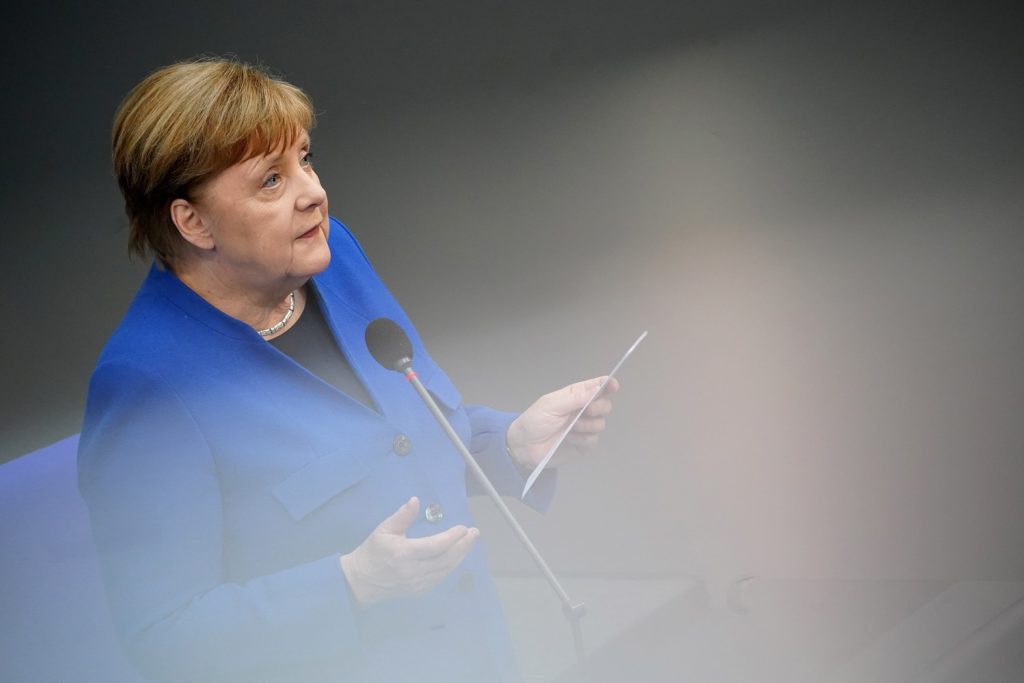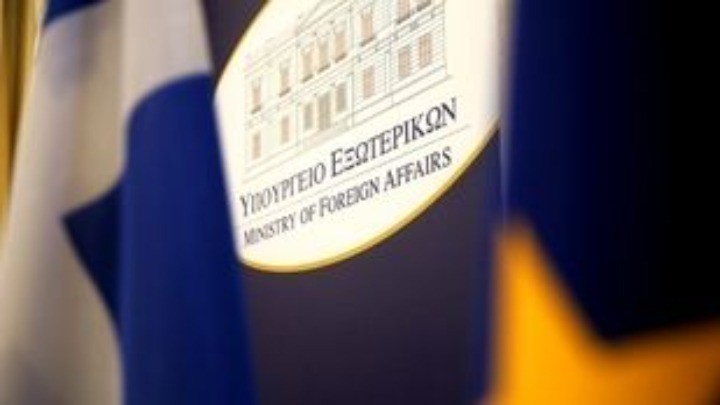
#Tags:
EU bordersEast Mediterranean conflictLaw of the SeaTurkish aggressionInternational Court of JusticeIs Germany Standing in Solidarity with Greece or Is Appeasing and Enabling Erdogan: Turkey’s Budding Hitler?

FILE PHOTO: German Chancellor Angela Merkel attends a question and answer session of the German parliament ‘Bundestag’ in Berlin. EPA, CLEMENS BILAN
By Constantine Tzanos*
On November 7, 1937, Adolf Hitler, at a meeting with the leaders of Germany’s armed forces, said: “The aim of German policy, is to make secure and to preserve the racial community and to enlarge it. It is therefore a question of space.”
The Germans have “the right to a greater living space than other people… Germany’s future is therefore wholly conditional upon solving of the need for space.” [ William L. Shirer, The Rise and Fall of the Third Reich, p. 305 ]
Erdogan has repeatedly stated that Turkey “is a continuation of the Ottoman Empire”, and is calling large parts of Eastern Mediterranean that belong to the Exclusive Economic Zone (EEZ) of Greece and Cyprus “the Blue Homeland” of Turkey. In 2016, Erdogan said: several Greek islands in the eastern Aegean “used to be ours. We have our monuments and our mosques there.” [ekathimerini] Of course, Erdogan failed to say to his people – many brainwashed with the power of the sword – that the lands called Turkey today were the homeland of Greeks for thousands of years before any Turk set foot upon them. He failed to tell them that everywhere you may turn your eyes on these lands you will see monuments of the Greeks and Greek churches, like Hagia Sophia that was very recently converted by Erdogan into a mosque.
In December 2017, Erdogan suggested that “some details” in the Treaty of Lausanne were “unclear” and that they may need to be revisited. Subsequently, he had maps shown on Turkish television with the current Turkish borders extending into Greece, Bulgaria, Armenia, Iraq and Syria. [the arab weekly] The Treaty of Lausanne established the permanent borders between post-Ottoman Turkey and its neighbors.
In November 2019, in violation of the law of the sea, Turkey signed an agreement with the government of Libya based in Tripoli that seeks to create an exclusive economic zone from Turkey’s southern Mediterranean shore to Libya’s northeast coast. The agreement is infringing on the EEZ rights of Greece and Cyprus. [ekathimerini]
Like Hitler, Erdogan is dreaming a “greater space” for Turkey and he is demonstrating his intentions to grab [gatestone institute] this space from neighboring states like Greece and Cyprus – two member states of the European Union – by military force.
On August 10, 2020, a U.S. State Department spokesperson said: [ekathimerini] “The United States is deeply concerned by Turkey’s stated plans to survey for natural resources in areas over which Greece and Cyprus assert jurisdiction in the Eastern Mediterranean. Such actions are provocative and raise tensions in the region.”
On August 19, 2020, European Council President Charles Michel, expressing the EU’s support to Greece and Cyprus, said [[ekathimerini.com]: “We are increasingly concerned about the growing tensions, and the EU Council stressed the urgent need to de-escalate. We expressed our full solidarity with Greece and Cyprus and recalled and reaffirmed our previous conclusions on the illegal drilling activities.”
These and similar verbal reactions by the U.S. and the EU have not deterred Erdogan, but have encouraged him to become more belligerent. The “love affair” of the U.S. President Donald Trump with Erdogan has neutralized the enforcement of the Countering America’s Adversaries Through Sanctions Act ( CAATSA) against Turkey. On the demand of Greece and Cyprus for sanctions against Turkey, on February 27, 2020, the EU Council imposed the laughable measure of sanctions against 2 Turkish nationals on the basis of their involvement in unauthorized drilling activities in the Eastern Mediterranean Sea. [european sanctions]
On July 23, 2020, French President Emmanuel Macron stated: “I stand fully behind Cyprus and Greece in the face of the Turkish violations of their sovereignty. It is unacceptable that the maritime space of (EU) member states be violated and threatened. Those who are doing that must be sanctioned.” [euractiv] The EU is Turkey’s biggest trading partner, and the EU can impose crippling sanctions on Turkey.
On August 14, 2020, Germany disagreed with Greece on measures to be taken against Turkey. [ekathimerini]. Germany is pushing for negotiations between Greece and Turkey, and on August 25, 2020, Germany’s Foreign Minister Heiko Maas said he had travelled to Athens with two messages: “One message is that Germany and the whole European Union stand by Greece in firm solidarity. The other – equally important – message is that what we now need absolutely and immediately are signals of de-escalation and a readiness for dialogue.” [[aljazeera]
Turkey’s “Blue Homeland” doctrine is violating Greece’s rights on its EEZ as they are codified in the United Nations Law of the Sea Convention, and Greece has stressed its readiness to
to sign with Turkey an agreement to submit any dispute on this matter to the International Court of Justice. [ekathimerini] On August 25, 2020, Turkey’s foreign minister, Mevlut Cavusoglu, called Greece’s proposal a “maximalist approach” and said that Turkey expects the EU to act as an “honest and objective” mediator. [aljazeera.com]
Turkey’s characterization of Greece’s proposal as a “maximalist approach”, clearly demonstrates that Turkey is seeking under the threat of war to get more than she would get in a resolution of the matter by the International Court of Justice. And this more can be either at the expense of Greece’s rights on its EEZ, or at the expense of its sovereign rights.
If Germany’s statement that Germany and the EU “stand by Greece in firm solidarity” is sincere, this would mean that Germany and the EU: do not accept Turkey’s pressure on Greece – by the threats of war – for Greece to surrender to Turkey some of its rights on its EEZ or some of its sovereign rights, and support Greece’s proposal to refer the matter to the International Court.
Cavusoglu stated that Turkey expects the EU to act as an “honest and objective” mediator. Again, if the statement that Germany and the EU “stand by Greece in firm solidarity” would be sincere, then the EU cannot be a mediator between Greece and Turkey in negotiations where Greece would be forced to give to Turkey to avoid the consequences of a war.
A mediator cannot stand in solidarity with the positions of one of the parties in the mediation. Acting as a mediator and standing in firm solidarity with one of the parties in the mediation are a contradiction. The mediator is a facilitator who has no power to render a resolution to the conflict, is a third neutral party, and neutral means that does not support – is not in solidarity with – one of the parties involved in the conflict. Obviously, Erdogan, by using the EU as a mediator, is trying to divide the EU, and render it useless to its members on issues of most critical importance.
Then, what is the meaning of Germany pushing Greece to negotiations with Turkey? What is the meaning of solidarity if Greece has to face Turkey at the table of negotiations where the choice is either to give to the satisfaction of Turkey – the aggressor – or face the consequences of war?
If Germany’s statement on solidarity is not of rhetorical or of limited value, it should be straightforwardly stated that Germany supports Greece’s proposal and will support Greece in any threats of war by Turkey. If Germany and the EU really “stand by Greece in firm solidarity”, it should be made unmistakably clear that they stand by Greece in solidarity in the defense of its land and sea borders that are also the borders of EU.
Does Germany stand in solidarity with Greece, or is playing the game of Turkey’s budding Hitler, because she is placing its short-term economic interests above the interest of the European Union? Is here the beginning of a process reminding the Munich Agreement with Hitler? With the signing of the Munich agreement, the allies of Czechoslovakia – UK and France – posed to Czechoslovakia the dilemma, either surrender its Sudetenland region to Germany to preserve peace in Europe, or face a war against Germany alone. Czechoslovakia made the concession to Germany, but peace in Europe was not preserved. A year later, Hitler annexed the remainder of Czechoslovakia.
*PhD, Nuclear Engineering
Chancellor Merkel: All, as EU member states, have the obligation to support Greece

